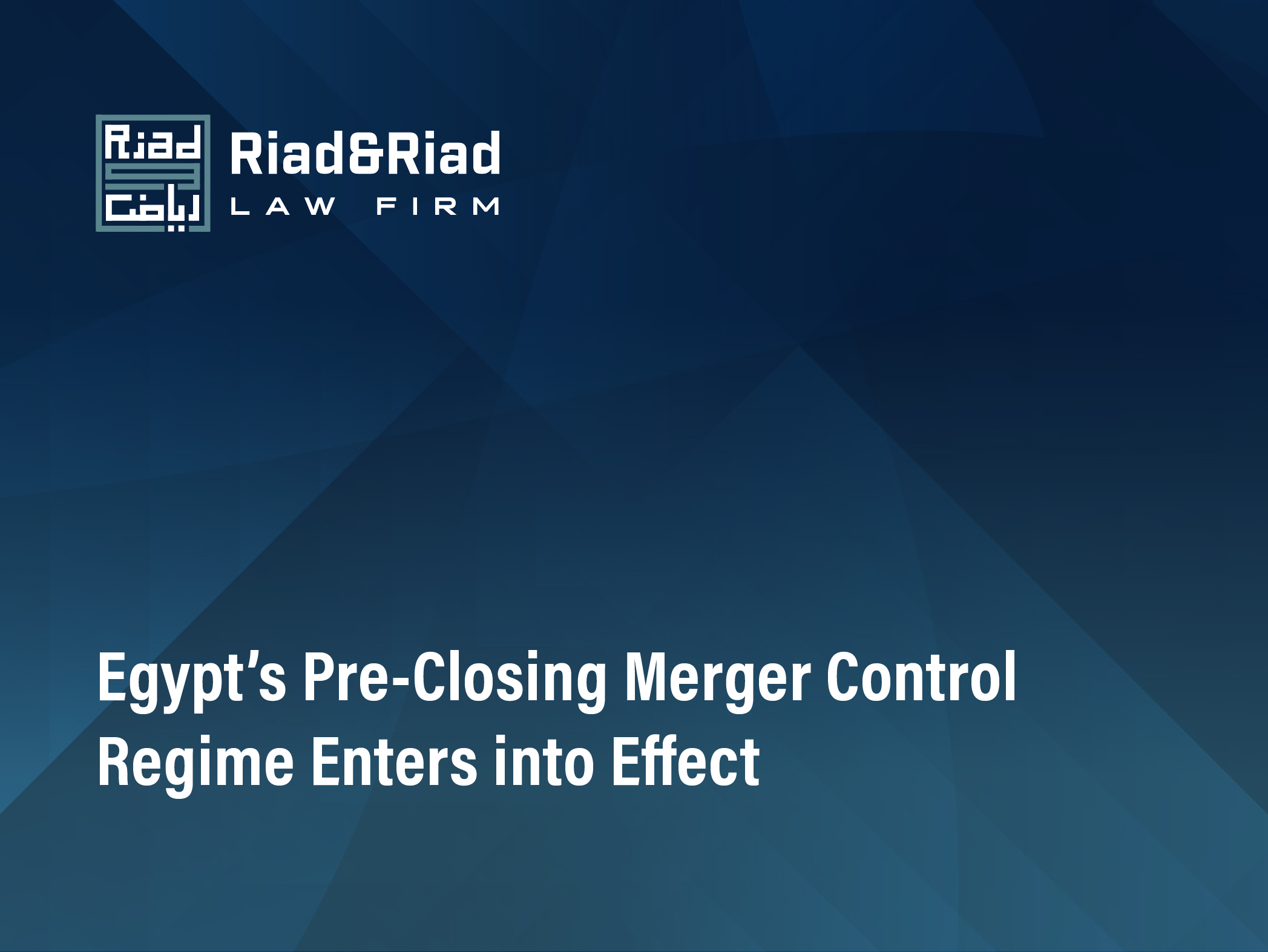
Egypt’s Pre-Closing Merger Control Regime Enters into Effect
Egypt amended its Protection of Competition and Prohibition of Monopolistic Practices Law No. 3 of 2005 (“Competition Law”) on 29 December 2022. The amending law No. 175 of 2022 (“Amendment Law”) introduced the long anticipated new pre-closing clearance regime on transactions constituting an ‘economic concentration’.
On the 4th of April 2024, the Prime Minister issued Decree 1120 for 2024 amending the Executive Regulations of the Competition Law (“Executive Regulations”) to put into effect the new regime starting from the 1st of June 2024. This means that any transaction which constitutes an ‘economic concentration’ and exceeds the turnover thresholds set by the Amendment Law will not be able to close without obtaining the pre-closing approval of the Egyptian Competition Authority (“ECA”).
What is Economic Concentration?
Economic concentration refers to the degree of market dominance held by a small number of firms within a particular industry or sector. It measures the extent to which market power is concentrated among a few players, potentially leading to reduced competition, higher prices for consumers, and barriers to entry for new market entrants.
Economic concentration is defined as any change of control or material influence over an entity that results from:
- Merger transaction, whether through consolidation or amalgamation.
- Acquisition transaction, whether direct or indirect, individual, or collective, through contractual arrangement, purchase of shares, purchase of assets or any other method.
- Establishing a full-function joint venture to conduct business in an ‘intendent and permanent manner’.
‘Control’ and ‘material influence’ are defined to be the ability to, directly or indirectly, influence the economic and strategic decisions as well as the business objectives of another entity.
Material influence typically occurs when a company holds a significant minority stake in another company, allowing it to exert influence over key decisions such as corporate strategy, management appointments, or business operations. Article 50 of the Executive Regulations gives examples of cases which constitutes material influence to include:
- Owning 25% of the shares or voting rights in another entity.
- Owning less than 25% of the shares or voting rights in another entity, in conjunction with one of the following
- Having voting rights which give the ability to influence the entity’s policies and commercial targets.
- The existence of contractual arrangements in the articles of associations of the company or the shareholders agreement or any other agreements which gives the acquiror preferential voting rights or veto rights over certain decisions.
- The existence of common shareholders between the acquiring entity and the target entity.
- The existence of a representative of the acquiring entity on the board of the target entity.
In all cases, acquiring less than 10% of the shares of voting rights of an entity will not constitute a material influence unless the acquiror is among the three biggest shareholders in the target.
What is not Economic Concentration?
The following will not constitute an economic concentration:
- Merger or acquisition transaction between subsidiaries of the same parent company for restructuring purposes and which does not result in any direct or indirect change of control or material influence.
- The temporary acquisition of securities, to be resold within one year, provided that the acquirer will not use any of its voting rights or take any action that would result in a material influence on the company.
What is the Turnover Threshold of an Economic Concentration?
An economic concentration transaction will trigger the pre-closing approval requirement only if it meets any of the following thresholds:
- If the combined turnover or assets of the parties in Egypt exceeds EGP 900 million (approx. US$ 19 million) during the previous financial year, provided that the turnover of at least two relevant parties exceeds EGP 200 million (approx. US$ 4.2 million) each in Egypt during the last fiscal year.
- If the combined turnover or assets of the parties worldwide exceeds EGP 7.5 billion (approx. US$ 158 million) during last financial year, provided that the turnover of at least one party in Egypt exceeds EGP 200 million during the last fiscal year.
The Executive Regulations determine the criteria for calculating the combined turnover and assets of the parties.
Economic concentration is prohibited in case it will lead to restricting freedom of competition. When evaluating a potential case of economic concentration, ECA will consider several elements to assess the potential impact of the proposed transaction on market competition, including the market structure, market share, barriers to entry, available alternatives for suppliers, customers and consumers, market dynamics and innovation and potential anti-competition effects.
The ECA will be entitled to review the transactions which do not meet the above thresholds within one year of the closing if it is conceived that such economic concentration will result in possible anti-competitive practices.
Filing and Approval Procedures and Timeline
Parties to an economic concentration transaction which meets the above thresholds are required to notify the ECA about the transaction and shall not close it until obtaining ECA’s approval, i.e., the notification has a suspensory effect.
Who has the duty to notify?
The duty to notify falls on the (i) acquiror in acquisitions of shares, assets, control or material influence over the target; (ii) merging parties in the event of a merger; and the (iii) parties to a joint project, as the case may be.
Content of Notification
The notification submitted by the merging parties typically includes detailed information about the transaction, such as the identities of the merging parties, the nature and purpose of the transaction, the relevant markets affected, and any potential anti-competitive effects. Providing accurate and comprehensive information is essential to facilitate the competition authority’s review process.
Publication
Upon submitting the notification, ECA will publish it in a widely spread newspaper or at its website for third parties to be able to submit their comments on the economic concentration within 15 days. The board of ECA might decide not to publish the notification for public interest.
FRA Related Transactions
Transactions related to any of the business activities which falls under the authority of the Egyptian Financial Regulatory Authority (“FRA”) Relevant parties must be notified with the transaction. The FRA will not approve the transaction until after obtaining the opinion of the ECA.
ECA Review
ECA will review the transaction in two phases:
- Phase 1: ECA has 30 working days (can be extended by 15 days) to review the file of the notified transaction and decide whether to approve it or otherwise to refer it to the second review phase in case it is decided that the transaction will be harmful or constraining to competition.
- Phase 2: the timeline for this review phase is 60 working days (can be extended by 15 days).
Upon finalizing the review process, ECA is authorized to approve the transaction, unconditionally or conditionally or otherwise block it. ECA will issue a conditional approval in case the applicant submitted a proposal for the undertakings and parameters it will follow during the investigation stages.
ECA’s fees for reviewing the file of the transaction shall not exceed EGP 100,000 (approx. US$ 2,100).
What are the Implications for Non-compliance?
Companies which fail to submit the pre-closing notification will be subject to a fine ranging between 1% and 10% of the value of the annual turnover or assets of the involved parties or the value of the transaction (whichever is highest), or a fixed amount ranging between EGP 30 million (approx. US$ 1 million) to 500 million (approx. US$ 16.8 million) if the value of turnover or assets is difficult to be calculated.
Fines will also be imposed if the parties failed to comply with the remedial measures determined by ECA or if the parties provided false information.
For more information, please contact Dr. Fatma Salah or Dr. Eman Riad.

